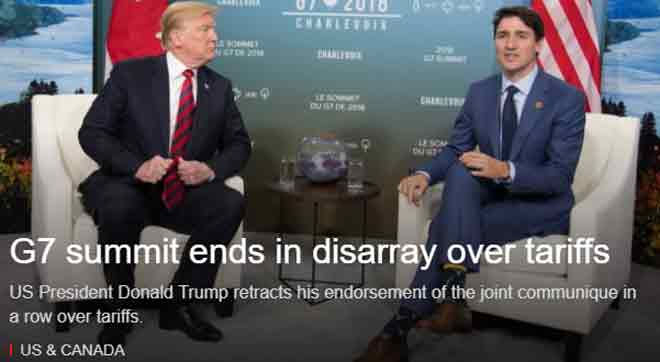
G7 summit ends in disarray as Trump abandons joint statement
US President Donald Trump has retracted his endorsement of the joint communique issued at the end of the G7 summit, accusing Canada of "dishonesty".
He said that other countries were imposing "massive tariffs" on the US.
The joint communique, advocating a "rules-based trading system", was reached despite tension over US tariffs on steel and aluminium imports.
Canadian Prime Minister Justin Trudeau vowed afterwards to press ahead with retaliatory tariffs on 1 July.
Speaking at a news conference, he described as "insulting" Mr Trump's decision to invoke national security concerns to justify steel and aluminium tariffs.
"It would be with regret but it would be with absolute clarity and firmness that we move forward wit
His words contained nothing he had not said before, both in public and in private conversations with Mr Trump, his office said later.
The EU said it would stick to the joint communique despite Mr Trump's decision.
"We stand by the commitments made in retaliatory measures on 1 July," Mr Trudeau said. "Canadians are polite and reasonable but we will also not be pushed around."
'Do not endorse'
Tweeting en route to his next summit in Singapore, Mr Trump said he had instructed US officials "not to endorse the communique as we look at tariffs on automobiles".
He said the move was based on Mr Trudeau's "false statements at his news conference, and the fact that Canada is charging massive tariffs to our US farmers, workers and companies".
He suggested Mr Trudeau was "very dishonest and weak".
Mr Trump had earlier signed the joint statement agreed by all the G7 nations despite the trade row.
He also tweeted defiantly about not allowing "other countries to impose massive tariffs and trade barriers on its farmers, workers and companies".
Until just a few weeks ago, the relationship between Mr Trump and Mr Trudeau could have been called cordial. Despite differences between the two countries over trade - from tiffs over everything from softwood lumber and newsprint to the major renegotiation of the trilateral North American Free Trade Agreement - the two men tended to speak positively about each other.
No longer.
The recent US decision to impose metals tariffs on Canada, the EU, and Mexico was a turning point. Mr Trudeau, who had taken a conciliatory approach towards Mr Trump, began using a much harsher tone. Polls indicate Canadians support the tougher tone.
The fact remains that the two countries' economies are deeply integrated, with jobs on both sides of the border counting on smooth trade between the neighbouring nations.
Whether or not this new phase in the Canada-US relationship will allow some of the trade sticking points to be resolved is still to be seen.
